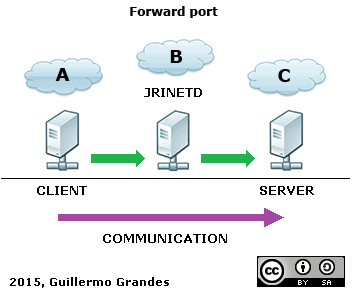jrinetd is an open source (Apache License, Version 2.0) Java TCP port redirector proxy. Do not require any external lib.
Current Stable Version is 1.1.2
- Machine-A (Client) init connection to Machine-B (jrinetd)
- Machine-B init connection to Machine-C (Server)
- Done: Machine-A is able to speak with Machine-C
- Machine-A (Client) may be in Internal network.
- Machine-B (jrinetd) may be in DMZ.
- Machine-C (Server) may be in External network.
# To redir stdout/stderr to (auto-daily-rotated) files you can use:
-Dlog.stdOutFile=/var/log/jrinetd.out -Dlog.stdErrFile=/var/log/jrinetd.err
# To log to stdout too:
-Dlog.stdToo=true
Filenames are a base-pattern, output files they will be: jrinetd.xxx.YEAR-MONTH-DAY (jrinetd.xxx.2015-08-01)
Config file must be in class-path ${JRINETD_HOME}/conf/, general format is:
#### Forward / Port Redirector
## forward <listen-addr>:<listen-port> <endpoint-list> [opts]
# Note: <endpoint-list> can be a coma separated list of addresses, like "srv1:80,srv2:80,10.0.0.3:8080"
- Options for outgoing connections
- Loadbalancing (only one option can be used)
- LB=NONE: disable LoadBalancing
- LB=ORDER: active LoadBalancing in order (DNS resolved IP address are sorted, lower first { 10.0.0.1, 10.0.0.2, 192.168.0.1 })
- LB=RR: active LoadBalancing in round-robin (DNS order)
- LB=RAND: activate LoadBalancing in random order
- LB=RANDRR: activate LoadBalancing in random order and round-robin
- Failover (default disabled)
- FAILOVER: enable FailOver (if connect fail, try next address)
- Sticky Session
- STICKY=MEM:bitmask:elements:ttl:sticky-name[:cluster-name]: activate Sticky session based on IP Source Address. Sessions are stored in MEMory, bitmask is a CIDR to apply in source-ip-address (16=Class B, 24=Class C, 32=Unique host), elements for LRU cache, ttl is time to live of elements in cache (seconds), sticky-name and cluster-name in cluster environment is cluster identifier and replication identifier respectively.
- Loadbalancing (only one option can be used)
- Options for inbound connections
- PROXY=SEND: use PROXY protocol (v1), generate header for remote server
# <listen-addr>:<listen-port> <endpoint-list> [opts]
forward 0.0.0.0:80 10.0.0.1:8080,10.0.0.2:8080
forward 127.0.0.1:443 www.acme.com:443 LB=RR,STICKY=MEM:24:128:300:sticky1
- More examples in sampleconf
./bin/jrinetd.sh <start|stop|restart|reload|status>
- Use Log4J
- Limit number of connections
- Limit absolute timeout/TTL of a connection
- Configurable retry-sleeps
- Thread pool/control
- Custom timeout by binding
- Audit threads / connections
- Statistics/Accounting
- JMX
- NIO (v1.0.0)
- BufferPool for reduce GC pressure (v1.0.0)
- Reload config (v1.0.0)
- Allow alternative config names (v1.0.0)
- Zip Packaging (Maven Assembly) (v1.0.0)
- Allow redir stdout/stderr to File, with auto daily-rotate (v1.0.0)
- PROXY protocol (v1) for Outgoing connections (v1.0.0)
- Multiple endpoint-list (not only DNS multi A-record) (v1.0.0)
- Sticky sessions in LoadBalancing (v1.0.0)
- Use multiple thread for multi-core machines (v1.0.0)
- Replicate Sticky Sessions over multiple jrinetd (HA) (v1.0.0)
- Improved support for embed -a little- (v1.1.0)
Current harcoded values:
- Buffer Pool size: 8192buffers (per thread)
- Buffer-Length for I/O: 2048bytes
- DNS cache: 3seconds
- Reload config check time interval: 10seconds
- Shutdown/Reload timeout: 30seconds
- Cluster Connection timeout: 10seconds
| microsecs | Direct | Forward |
|---|---|---|
| min | ? | ? |
| max | ? | ? |
| avg | ? | ? |
| (transfers) | Direct (x2) | Forward (x4) |
|---|---|---|
| Mbytes | ? | ? |
| Mbits | ? | ? |
All test run on localhost on a Laptop. Values are not accurate, but orientative. Latency { EchoServer, 1 byte write/read (end-to-end, round-trip), 100K iterations } Lower Better. Throughput { Chargen, 1024bytes read & write (full-duplex), total 512MBytes } Higher better.
Inspired in rinetd, this is a Java-minimalistic version.
